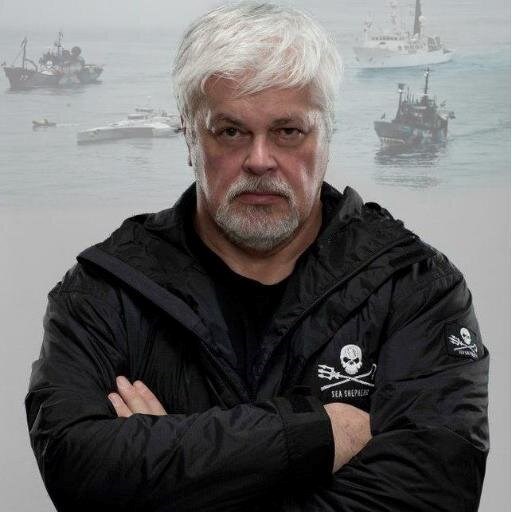 |
| Paul Watson posing (https://twitter.com/captpaulwatson (unknown)) |
"I do what I do because it is the right thing to do. I am a warrior, and it is the way of the warrior to fight against superior odds"(Paul Watson). This statement shows Watson's attitude about his role in the world, and how he feels that it's his mission to fight on, despite being less powerful than his opponents, which are those that harm the ocean and wildlife. Paul Watson is the founder of the Sea Shepherd Conservation Society, which has been working to protect whales, dolphins, seals and other sea life since 1977. Watson often travels to the waters off of Antarctica to protect whales from whalers. Watson also spends a lot of his time working in the Galapagos Islands, attempting to stop poachers and other illegal activity when the Ecuadorian Navy will not. A hero must possess bravery and the passion to do what is right. Paul Watson has consistently shown bravery, by traveling to dangerous places, by confronting violent people, and by often putting himself in harm's way. He is passionate about protecting those creatures who cannot protect themselves. He feels it is wrong to destroy the oceans, to drive species to extinction, and to act with callousness and greed.
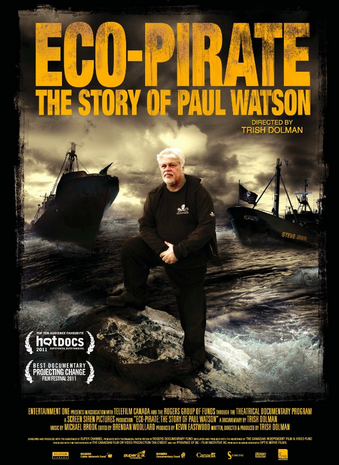 |
| A magazine cover of Paul Watson (http://en.wikipedia.org/wiki/Eco-Pirate:_The_Story (wikipedia)) |
Paul Watson takes great risks for the sake of wildlife and their habitat. He has faced Canadian seal hunters who are armed with clubs. He has confronted Japanese whalers on the high seas, and damaged their ships so that they cannot kill whales. "The Japanese say that they are hunting whales in order to ascertain when there will be enough to harvest for profit. In 2005, they killed more than a thousand." (Khatchadourian, Raffi) He has taken actions he calls "aggressive non-violence", which has resulted in his arrest in several countries, but he is willing to accept the consequences of his actions, and feels that the end justifies the means. Watson often travels to the seas around Antarctica, to the Southern Ocean Whale Sanctuary, which ironically is not a safe place for whales due to the Japanese, Norwegian and Icelandic whalers who do not follow the rules set by the International Whaling Commission. "The Japanese have produced virtually no research of any regard, and all the whales are butchered for the purpose of selling selling whale meat to the public." (Hume, Mark) Watson has also spent time off the coast of Costa Rica, catching shark hunters and stopping other illegal activity. He has received death threats for his actions, but does not let that stop him. Because Paul Watson is willing to risk not only his own life, but the lives of his crew as well for the sake of the mission, he has received much criticism. But he feels that his crew is well aware of the dangers they face and agree to the risks when they sign on with him. Watson is no stranger to criticism. He has been called stubborn, difficult, uncompromising, obsessive, and he accepts all of it. In fact, he seems proud of those labels. He sees himself as different than other people, he has set himself apart and follows his own rules, not those of anyone else. He lives by his own code of ethics and does what his conscience tells him he must do, regardless of the difficulties involved, and he is relentless in his pursuit of justice for the animals of the world, who he feels have no voice, and no hope, without him. He is their hero, and he is a hero to everyone who believes in his cause and in his goal of a clean planet, abundant with wildlife that are safe, and free.
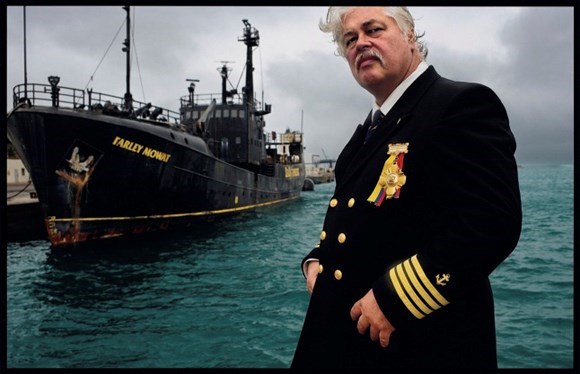 |
| Paul Watson dressed in captain's attire (http://www.newyorker.com/news/news-desk/whale-war-fugitive-q-a-with-paul-watson) |
Paul Watson has innovative ideas on how to save wildlife. He is known for pursuing and often damaging whaler's ships, "fouling" their decks and equipment. "He does what he thinks is right, even if it involves a violation of custom or the destruction of property." (Khatchadourian, Raffi) .He has stopped destructive trawlers, drift netters, and blocked ships carrying seal hunters. He claims to have sunk 10 ships during his career of safeguarding whales, dolphins, seals and other animals. "There are a number of rules belonging to civilization that outrage his sense of morality, among them the 1982 Convention on the Laws of the Sea, which asserts that sovereign states are the ocean's enforcers. If such rules interfere with his agenda, then as far as he is concerned, rules be damned." (Khatchadourian, Raffi). Sea Shepherd doesn't just hold up a sign that says "Save The Whales". They put themselves in between whales and the deadly harpoon machines of Japanese whaling ships. This shows that Paul Watson is not the typical wildlife warrior. He is truly going to war to save what he loves. His actions also bring much needed attention to the plight of these animals, and to the bad things that are happening to oceans around the world - things that most people would not know anything about otherwise. He uses the media attention that they get to his advantage, to spread information to the world about what he considers crimes against nature. And his new mission is called "Air Shepherd", flying over vast areas of Africa, looking for poachers who are killing elephants and rhinos.
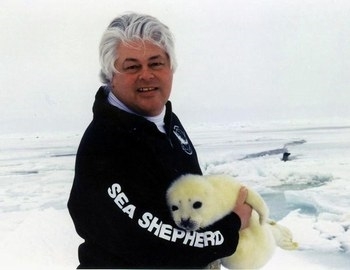 |
| Paul Watson holding a baby seal pup (http://blog.enfemenino.com/blog/seeone_405977_8068 (unknown)) |
Paul Watson works to protect the creatures of this world in any way that he can. He is willing to do what other wildlife protection groups are not. Watson refers to his group as "Neptune's Navy", and himself as a guardian of the sea. For over 35 years, he has dedicated his life to saving wildlife and the oceans of the world. In 1976 and 1977, Watson didn't just protest the slaughter of thousands of baby seals, he went to the ice and actually grabbed a club out of a hunter's hand and threw it into the ocean. "The horrific scene of baby seals being clubbed and skinned alive while their mothers looked on helplessly enraged him." (Gatehouse, Jonathan) His fellow Greenpeace members decided his actions didn't go along with their more non-confrontational methods, and he was voted out of the organization. "Watson has a tendency to see things in their essence rather than in their particulars." (Khatchadourian, Raffi) But that event led to his forming Sea Shepherd, and he has led them ever since. Another example of his commitment is that rather than just visiting the Galapagos Islands periodically, he set up a permanent office there and hired someone to work there full time, in order to address the many serious environmental threats that face the area, and the illegal activity that has been allowed to go on there.
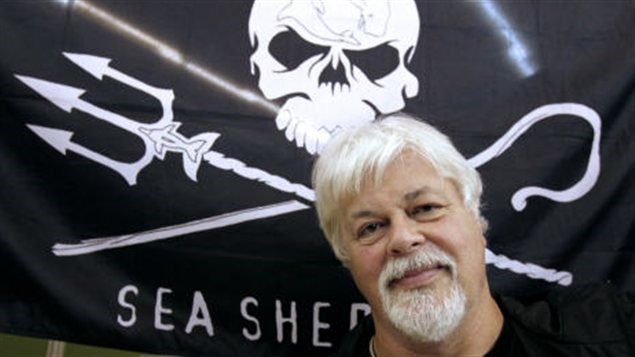 |
| Paul Watson smiling in front of his flag (http://www.occupyforanimals.net/captain-paul-watso (unknown)) |
Paul Watson inspires me because he bravely protects the creatures of the Earth in any way that he can. He travels to dangerous parts of the world, and puts himself between hunters and animals, risking his life all the time in order to save wildlife and the oceans they need to survive. Watson calls his methods "coercive conservation". This is significant because although it is meant to be slightly humorous, it really does describe in a serious way the things that Sea Shepherd does. Watson possesses all the traits of a hero - bravery, passion, and a willingness to do whatever it takes, fighting for what is right. His commitment and his courage affects other people deeply, and inspires others to want to do the same. His passion is contagious, and I for one am glad that he exists in this world. I only wish that there were a lot more Paul Watsons, because we, and the wildlife of the Earth, need them now more than ever. Paul Watson is saving lives, the lives of those who are helpless and at the mercy of the powerful, and that to me is the truest definition of a hero.
Page created on 4/21/2015 12:00:00 AM
Last edited 4/21/2015 12:00:00 AM
